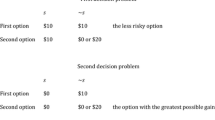Abstract
This paper presents an axiomatization of the principle of maximizing expected utility that does not rely on the independence axiom or sure-thing principle. Perhaps more importantly the new axiomatization is based on an ex ante approach, instead of the standard ex post approach. An ex post approach utilizes the decision maker's preferences among risky acts for generating a utility and a probability function, whereas in the ex ante approach a set of preferences among potential outcomes are on the input side of the theory and the decision maker's preferences among risky acts on the output side.
Similar content being viewed by others
REFERENCES
Allais, M. (1953) Le comprtement de l'homme rational devant le risque: Critique des postulates et axioms de l'ecole'americaine, Econometrica 21, 503–546.
Arrow, K. J. (1963) Social Choices and Individual Values, Wiley.
Bales, R. E. (1971) Act-utilitarianism: Account of right-making characteristic or decisionmaking procedure?, American Philosophical Quarterly 8, 257–265.
Broome, J. (1999) Ethics out of Economics, Cambridge University Press.
Davidson, D. et al. (1957) Decision Making: An Experimental Approach, Stanford University Press.
Fishburn, P. (1981) Subjective expected utility: A review of normative theories, Theory and Decision 13, 139–199.
Hansson, B. (1988) Risk aversion as a problem of conjoint measurement, in Gäredenfors and Sahlin (eds.), Decision, Probability, and Utility, Cambridge University Press.
Hansson, S. O. (2001) The Structure of Values and Norms, Cambridge University Press.
Herstein, I. N. and Milnor, J. (1953) An axiomatic approach to measurable utility, Econometrica 21, 291–297.
Jeffrey, R. (1965) The Logic of Decision, 2nd edn, University of Chicago Press, 1983.
Joyce, J. (1999) The Foundations of Causal Decision Theory, Cambridge University Press.
Kagel, J. H. and Roth, A. (1995) The Handbook of Experimental Economics, Princeton University Press.
Krantz et al. (1971) Foundations of Measurement: Volume 1, Additive and Polynomial Representations, Academic Press.
Malmnäs, P.-E. (1994) Axiomatic justifications of the utility principle-A formal investigation, Synthese 99, 233–249.
von Neumann, J. and Morgenstern, O. (1947) Theory of Games and Economic Behavior, 2nd edn, Princeton University Press.
Oddie, G. and Milne, P. (1991) Act and value: Expectation and the representability of moral theories, Theoria 57, 42–76.
Peterson, M. (2002) An argument for the principle of maximizing expected utility, Theoria 68, 112–128.
Peterson, M. (2003) Transformative decision rules, Erkenntnis 58, 71–85.
Rabinowicz, W. (1997) On Seinfeld's criticism of sophisticated violations of the independence axiom, Theory and Decision 43, 279–292.
Ramsey, F. P. (1926) Truth and probability, in Mellor (ed.), Foundations: Essays in Philosophy, Logics, and Methematics and Economics, Routledge & Kegan Paul, 1978.
Resnik, M. (1993) Choices. An Introduction to Decision Theory, University of Minnesota Press. 1st edition 1987.
Roberts, F. (1979) Measurment Theory, in Gian-carlo Rota (ed.), Encyclopedia of Mathematics and its Applications 7, Addison-Wesley, Reading, Mass.
Savage, L. J. (1954) The Foundations of Statistics, 2nd edn, Wiley, 1972, Dover.
Schmidt, U. (1998) Axiomatic Utility Theory under Risk: Non-Archimedian Representations and Application to Insurance Economics, Lecture Notes in Economics and Mathematical Systems, Springer-Verlag.
Tännsjö, T. (1998) Hedonistic Utilitarianism, Edinburgh University Press.
Yilmaz, M. R. (1997) In defense of a constructive, information-based approach to decision theory, Theory and Decision 43, 21–44.
Zynda, L. (2000) Representation theorems and realism about degrees of belief, Philosophy of Science 67, 45–69.
Author information
Authors and Affiliations
Rights and permissions
About this article
Cite this article
Peterson, M. From Outcomes to Acts: A Non-Standard Axiomatization of the Expected Utility Principle. Journal of Philosophical Logic 33, 361–378 (2004). https://doi.org/10.1023/B:LOGI.0000036852.81010.db
Issue Date:
DOI: https://doi.org/10.1023/B:LOGI.0000036852.81010.db



